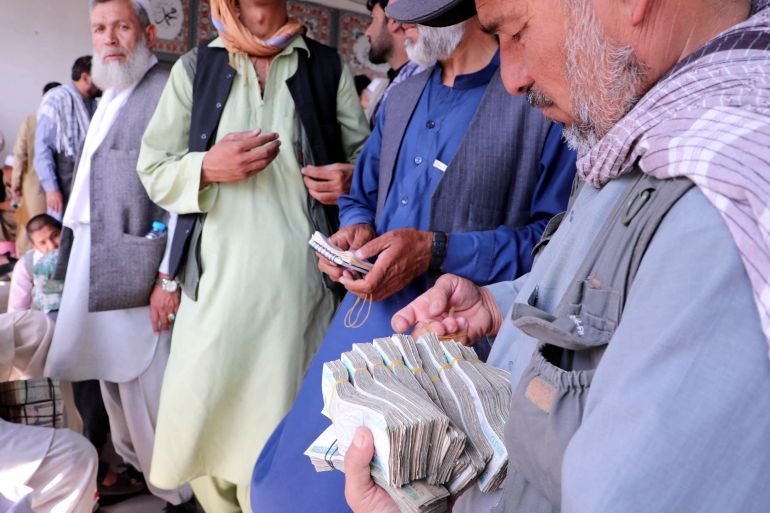Biden signs order to secure Afghan funds for aid, 9/11 families
The White House says the order is designed to ‘provide a path for the funds to reach the people of Afghanistan’.

United States President Joe Biden has signed an executive order creating the possibility of splitting $7bn in frozen Afghan funds held in the US, potentially allotting half for humanitarian aid to the country while keeping the other half available for possible seizure by victims of the September 11 attacks.
The executive order signed on Friday said the administration “will seek to facilitate access to $3.5 billion” of the Afghan assets currently held by the Federal Reserve of New York “for the benefit of the Afghan people and for Afghanistan’s future”.
Keep reading
list of 3 itemsQatar reaches deal with Taliban to resume evacuations: Report
Humanitarian aid on agenda as Taliban officials land in Geneva
However, it said the allocation of those funds would be “pending a judicial decision”. The White House also referenced legal claims by families of 9/11 victims who have said that they are entitled to the money following previous default rulings against the Taliban and other groups named in earlier lawsuits.
The Biden executive order said that even if the pending judgement allows $3.5bn to go to the people of Afghanistan, another $3.5bn would stay in the US and remain “subject to ongoing litigation by US victims of terrorism”.
In a statement, the White House said the order is “designed to provide a path for the funds to reach the people of Afghanistan, while keeping them out of the hands of the Taliban and malicious actors”.
The Taliban’s takeover of Afghanistan in August 2021 prompted governments and international institutions to swiftly freeze Afghan Central Bank assets abroad, totalling about $10bn. About $7bn of that was held in the US.
The Taliban has repeatedly called on the US and other governments and institutions to release the funds, saying they were needed to stabilise Afghanistan’s ravaged economy and prevent a humanitarian crisis.
The Taliban lashed out at the latest US move.
“The theft and seizure of money held/frozen by the United States of the Afghan people represents the lowest level of human and moral decay of a country and a nation,” Taliban spokesman Mohammad Naeem said Friday on Twitter.
The US does not recognise the Taliban as the legitimate government in Afghanistan and has designated the group a “terrorist organisation”. Rights groups have also called on the US to release the funds through humanitarian channels that largely bypass the Taliban.
A senior US administration official said it will take months to unfreeze funds for aid to Afghanistan because of the continuing lawsuits, stressing that the money – regardless of the amount – would not be able to address Afghanistan’s immediate humanitarian crisis.
“Because we have to go through a judicial process here, it is going to be at least a number of months before we can move any of this money, right? So this money isn’t going to be available over the next couple of months regardless,” the official told reporters early on Friday.
Friday’s executive order came as the US government faced a court deadline to state its position on pending attempts by 9/11 families to seize the Afghan funds.
At least one group of families has argued that they are entitled to the funds based on a 2012 ruling that awarded them monetary damages in a case that named Osama bin Laden, the Taliban, al-Qaeda, and Iran, among other defendants.
Other groups of victims’ families have argued that they are also entitled to the funds based on default rulings, although those cases never progressed to a final ruling on damages.
Prior to the Taliban takeover, Afghanistan’s government was about 75 percent dependent on foreign aid. With that support cut off, the dire humanitarian situation in the country has spiralled.
The United Nations has said 96 percent of Afghans could fall into poverty in 2022. Millions remain on the brink of famine in the country.